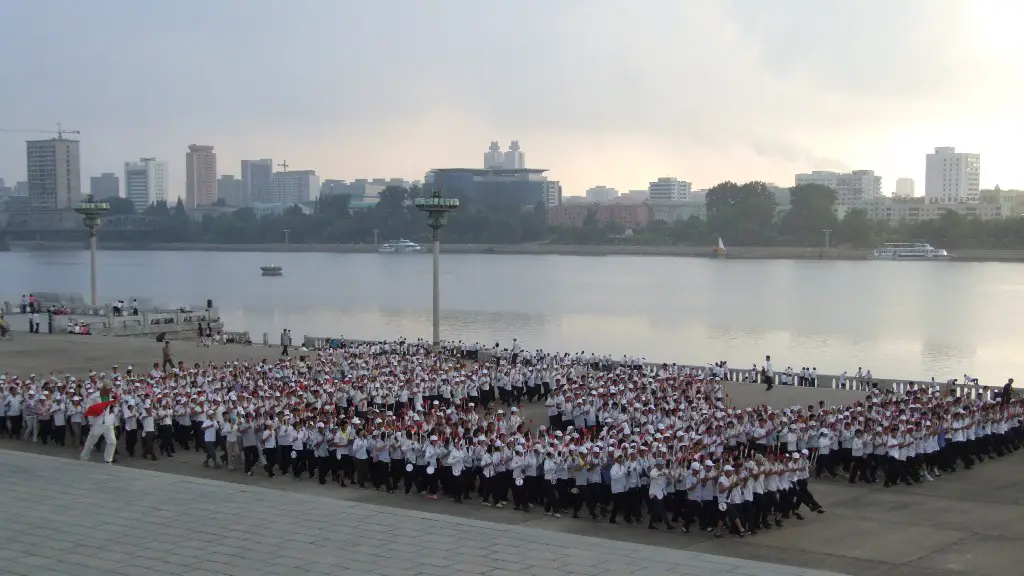Background On North Korea Nuclear Weapons
North Korea has long been a source of international tension, and in 2018 it significantly increased after the DPRK increased its nuclear capabilities. In January 2018, the US and South Korea established a joint committee to prevent the spread of nuclear weapons in North Korea. In April 2018, North Korea announced its intention to join the Comprehensive Nuclear Test Ban Treaty. However, these efforts have largely been unsuccessful and the DPRK continues to pursue nuclear weapons despite international condemnation.
In events leading up to the Korean War the United States and allies were concerned about the possibility of North Korea acquiring and deploying nuclear weapons. North Korea joined the Nuclear Non-Proliferation Treaty (NPT) in 1985, but the North’s nuclear ambitions were again brought to the forefront in 2002 with the appearance of illicitly acquired uranium enrichment equipment. The United States suspended negotiations on North Korea’s nuclear program in 2003, leading to six-party talks involving the United States, China, Japan, South Korea and Russia.
Treaty Of Non Proliferation Of Nuclear Weapons
The Treaty on the Non-Proliferation of Nuclear Weapons (NPT), made a commitment to prevent the spread of nuclear weapons and weapons technology. Under the agreement, signatories pledged to pursue nuclear disarmament, work towards better relations between nuclear and non-nuclear powers and not to transfer nuclear weapons to other countries. North Korea signed the NPT in 1985, but it withdrew in 2003 citing its pursuit of nuclear weapons.
The NPT looks to prevent the development, ideation, and proliferation of nuclear weapons, mainly by prohibiting their acquisition by non-nuclear states. It also seeks to limit the use of nuclear weapons in general and promote cooperation in the peaceful uses of nuclear technology.
In response to the NPT, the IAEA (International Atomic Energy Agency) inspects states that sign the treaty to make sure they are not conducting nuclear weapons activities. This inspection process, however, was abandoned in North Korea after the country pulled out of the NPT in 2003 and has not been resumed since. This withdrawal prevented any international monitoring of North Korea’s nuclear program.
Significance Of Denuclearization Of The Korean Peninsula
The United Nations Security Council has repeatedly urged North Korea to abandon its nuclear program. The denuclearization of the Korean Peninsula would be significant for regional peace and stability. It would also serve as a symbol of the country’s commitment to move towards a more peaceful and democratic future.
The Korean Peninsula has long been a flashpoint in the world and a hotbed of political tension. North Korea’s pursuit of nuclear weapons has been a major concern for decades. A denuclearized Korean Peninsula would potentially lead to greater regional stability, economic growth, and improved diplomatic relations throughout the region.
In addition, there is the potential for significant economic and social gains for the people of North Korea. Nuclear weapons development has consumed large amounts of money that could be used for economic development and social welfare. Removing its nuclear program would also help to mend ties between North Korea and its neighbors, as well as its relations with the United States.
Potential Disadvantages Of Denuclearizing North Korea
However, there are also potential disadvantages associated with denuclearizing North Korea. Some experts believe that North Korea may feel increasingly threatened and vulnerable if it gives up its nuclear weapons. Without the security of its own nuclear weapons, North Korea may become more reliant on other powers for protection. This could result in a power imbalance as North Korea would become more susceptible to pressure and manipulation from the other great powers in the region.
In addition, North Korea may not want to give up its nuclear weapons due to fears that other countries are engaging in nuclear proliferation. North Korea’s leaders may view nuclear weapons as the only form of security against other states in the region. This could make it difficult to convince the leadership to give up these weapons.
Finally, there is the possibility that denuclearizing North Korea could lead to economic sanctions from the international community. North Korea has been heavily reliant on foreign aid in recent years, and a complete denuclearization could result in economic sanctions from the international community that would further hamper the DPRK’s economic growth and development.
What Will It Take To Achieve Denuclearization Of The Korean Peninsula?
For denuclearization of the Korean Peninsula to be achieved, there would have to be a strong commitment to negotiating a peace treaty between North and South Korea. negotiations between the two countries should include the dismantling of North Korea’s nuclear arsenal in exchange for security and economic aid. The signing of such a treaty would mark a major milestone in the effort to create peace and stability in the region.
In addition, the other members of the six-party talks would need to be involved in the process. China, Japan, the United States and Russia will each have to play a role in ensuring the successful denuclearization of North Korea. All parties must be willing to compromise in order ensure that any negotiated agreement is beneficial to all parties involved.
Finally, the international community must provide strong economic and security aid to North Korea as incentives for the country to denuclearize. This will help to ensure that North Korea does not backtrack on its commitment to nuclear disarmament and that the country’s leaders continue to adhere to the terms of the peace treaty.
Alternative Path To A Non Nuclear North Korea
While negotiations and economic incentives are a key part of the process, they are far from the only possible paths to achieving a nuclear-free North Korea. The country could work with the international community to develop a strategy that focuses on economic development, enhanced security, and improved relations with other states. This would help to create a more stable environment that could lead to greater peace and stability in the region.
In addition, North Korea could look to developing alternative sources of energy in order to reduce its reliance on nuclear power. The country currently relies heavily on nuclear power and developing alternative sources could help to reduce its nuclear arsenal and its need for weapons-grade materials. This could also potentially lead to economic gains for the country, as alternative energy sources are often cheaper and more efficient than nuclear power.
Finally, North Korea could work on improving its diplomatic relations with the international community. Currently, North Korea is largely isolated from much of the world and this has hindered its ability to be an effective international partner. Improving diplomatic relations with other states could potentially reduce the country’s reliance on nuclear weapons.
Conclusion
North Korea’s acquisition and deployment of nuclear weapons have been a constant source of international tension. The Treaty on the Non-Proliferation of Nuclear Weapons (NPT) was created to prevent nuclear weapons from spreading and protect peace and stability in the region. Despite North Korea’s withdrawal from the NPT and its ongoing pursuit of nuclear weapons, denuclearizing the Korean Peninsula could still be achievable through negotiations and economic incentives. Additionally, alternative paths to a non-nuclear North Korea, such as improved economic development, enhanced security, and improved diplomatic relations with other states would also be beneficial and should be explored.




